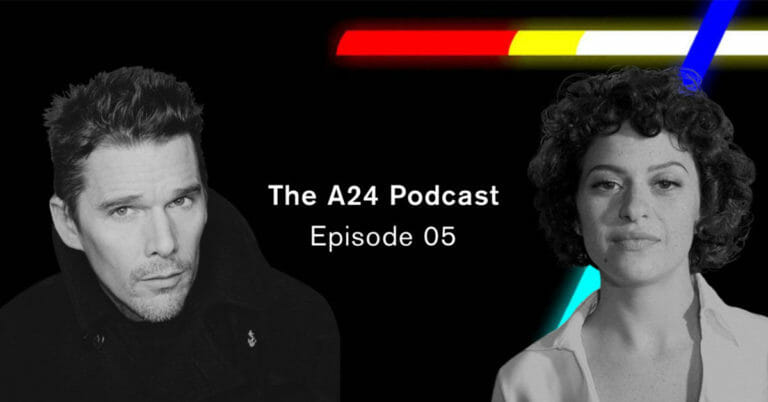By Ben Larned · October 15, 2018

When sitting down to the fifth A24 podcast recording, one might not be prepared to engage with heavy life lessons about the nature of art. Or maybe that’s exactly what we should expect. Ethan Hawke and Alia Shawkat, who have both acted for the studio before and worked on the music biopic Blaze together, seem to have a lot on their minds. While discussing the complexities of storytelling in a turbulent era and the nuances of entertainment life, the artists give us a few tips on how to maintain happiness in a world that doesn’t always give us what we want.
Both artists agree that their perspective on their work has been affected by the political climate. “Anything that tells the truth is kind of political,” Hawke says; and the ideal of art is to tell the truth. Shawkat believes that entertainment requires honesty now, especially after the upheaval of last year’s forced transparency. If Hollywood is to continue justifying its existence, it has to meet a certain moral standard, and that standard should be honest. So, how do we keep ourselves working at that level?
Of course, Hollywood and success aren’t the only worthwhile topics when discussing art. As indie actors and artists, Hawke and Shawkat can both speak to the passion that comes to a project that doesn’t bring anyone money. Actors who worry about getting hired again won’t give a full performance – they can’t always afford to look vulnerable. Often, the best performances come from people who don’t care about image.
Shawkat’s Blaze costar Ben Dickey had never acted before, and Hawke notes his natural confidence in the situation – a confidence that women are not allowed in a scrutinizing industry. It’s a plague that many young actors fall into as well, with industry authorities tell them to alter their appearances or maintain a certain poise. Shawkat notes that she had to overcome self-consciousness as she came of age.
This principle can be applied to writing as well. While we’d all like to be Sorkins and Chayefskys, authenticity and loyalty to the material are utmost when crafting a story. If one writes to show off intellect and prowess, one will miss the most important ingredients: communication and discovery. We write to discuss and examine experiences, which becomes a kind of productive therapy.
Both Hawke and Shawkat have experienced personal catharsis through painting. Hawke notes the connectivity of painting together – the required silence yields personal revelations. It’s the childlike exploration that comes with it, which can bring out other layers of one’s self.
Shawkat agrees that being able to test other art forms through her profession has allowed her to find new pieces of herself. It’s a privilege that few artists know, but it’s one to remember – when the only stakes are passion, honesty comes forward. It becomes a person’s responsibility, then, to do art either for commerce or personal growth; achieving both in the same project is a rare feat.
Continuing the above point, Hawke also discusses the psychological toll of making art your profession. It becomes taxing because it comes with celebrity, being known for a craft that has nothing to do with your inner self. This can diminish the meaning and honesty of the work, when one does it just to maintain image. Says Hawke, “When you work in service of something beyond your own self-aggrandizement, it feels really right, and it comes out better. It becomes integrated with your whole life.”
While Hawke’s universe-driven perspective isn’t precisely practical, it’s a strong reminder that one’s art has to remain separate from gain. It’s instinct and kismet, which sometimes never aligns; but if it doesn’t, it might be for the best. Shawkat compares it to metamorphosis through connection, not gain. Money might be a necessity in some ways, but both artists agree that it isn’t a barometer of personal success – people gain a more nebulous, potentially more valuable, thing from creating art.
Both artists note the importance of seeking one’s own opportunities. Hawke says that waiting for a good part isn’t a practical way of going about it – sometimes you have to make your own opportunities if you hope to yield the reward, the catharsis. To put it more spiritually, putting yourself into the universe will allow the universe to give back. “Don’t wait for somebody to give you permission,” Hawke says. Do your work for you, and if it reaches someone else, that’s a bonus.
Despite being acclaimed in multiple spaces, Hawke and Shawkat both speak to the self-denying voice in one’s head – the voice that one has to surmount in order to make their own stuff. Failure and humiliation are possibilities, but so are success and discovery.
This freedom is where the love for art comes from. The intimacy and connection of a shared passion creates compassion that isn’t necessarily romantic. It’s the reward of leaning into one’s art and allowing themselves to try.
Listen to the fifth A24 podcast below.
Do these discussions help you in your own process? Keep up with A24’s podcast, and The Script Lab, for more advice!
 BEN LARNED is an independent genre writer and filmmaker based in Los Angeles. He has written for outlets such as Blumhouse, Bloody Disgusting, WeScreenplay and ScreenCraft. His column Forbid
BEN LARNED is an independent genre writer and filmmaker based in Los Angeles. He has written for outlets such as Blumhouse, Bloody Disgusting, WeScreenplay and ScreenCraft. His column Forbid
Photo credit: A24.
For all the latest from The Script Lab, be sure to follow us on Twitter, Facebook, and Instagram.